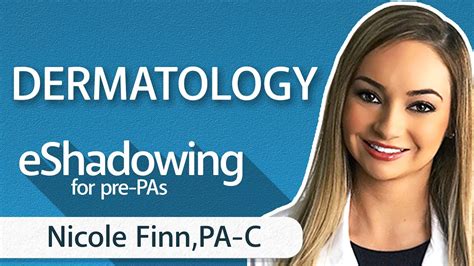Gaining Practical Experience: Your Path to Dermatology PA Success
Becoming a successful Physician Assistant (PA) in dermatology requires more than just book smarts and a strong academic record. Practical experience is the key that unlocks the door to a fulfilling and rewarding career in this specialized field. This comprehensive guide will explore the various pathways to gaining valuable experience, helping you navigate your journey toward dermatology PA success.
What Makes Dermatology PA Experience So Crucial?
Dermatology is a highly visual and hands-on specialty. You'll be dealing with complex skin conditions, performing procedures, and interacting with patients who often have sensitive concerns. Textbook knowledge alone isn't enough; you need real-world experience to develop the diagnostic acumen, procedural skills, and patient communication techniques essential for success. This experience helps you:
- Develop Proficiency in Dermatological Procedures: From mole removals to biopsies to cosmetic treatments, practical experience allows you to hone your skills and build confidence.
- Refine Diagnostic Skills: Learning to accurately diagnose skin conditions requires practice and observation. Real-world experience exposes you to a wide range of presentations and allows you to refine your diagnostic abilities.
- Master Patient Interaction in a Sensitive Context: Dermatology patients often grapple with self-esteem issues related to their skin. Building rapport and providing empathetic care is vital, and experience teaches you how to navigate these nuanced interactions.
- Understand the Workflow of a Dermatology Practice: You'll gain insight into the day-to-day operations, from scheduling and patient flow to insurance billing and electronic health records (EHR) management.
How to Gain Practical Dermatology PA Experience
There are several avenues you can explore to gain the necessary experience:
1. Dermatology-Focused Clinical Rotations During PA School:
Maximize your rotations. Actively seek out dermatology rotations during your PA program. Don't just passively observe; actively participate in patient care under the supervision of experienced dermatologists and PAs. Express your keen interest in dermatology to your preceptors and seek opportunities to perform procedures under their guidance.
2. Dermatology-Specific Volunteer Opportunities:
Many free clinics and community health centers offer dermatology services. Volunteering provides exposure to a diverse patient population and practical experience in a supportive environment. While you may not perform procedures independently, you can assist with patient examinations, charting, and other tasks, contributing to the overall clinic flow and learning from experienced clinicians.
3. Shadowing Dermatology PAs and Dermatologists:
Shadowing allows you to observe experienced professionals in action. Reach out to dermatologists and PAs in your area, expressing your interest in shadowing them for a day or even a week. This provides invaluable insight into their workflow and the daily challenges they face. Remember to be respectful of their time and prepared to assist in any way possible.
4. Seeking Employment as a Medical Assistant or Medical Scribe in a Dermatology Practice:
While not directly involving PA-level tasks, these roles provide a foot in the door. You'll gain familiarity with the clinic's environment, electronic health records, and dermatological procedures. It's an excellent opportunity to network with dermatologists and PAs and learn the practicalities of running a successful dermatology practice. This experience demonstrates initiative and can be a valuable asset on your resume.
5. Post-Graduation Fellowships or Residency Programs:
Some institutions offer post-graduate fellowships or residency programs specifically for PAs in dermatology. These programs offer structured training in advanced dermatological procedures and management of complex skin conditions. While competitive, securing a fellowship significantly boosts your career prospects.
What to Emphasize During Your Search for Experience
- Proactive Engagement: Don't be passive. Actively seek out opportunities and express your enthusiasm for dermatology.
- Networking: Building connections with dermatologists and PAs is vital. Attend conferences, join professional organizations, and use your network to find opportunities.
- Demonstrating Interest and Aptitude: Showcase your dedication to dermatology. Read relevant journals, stay updated on the latest research, and demonstrate a genuine passion for the field.
Frequently Asked Questions (FAQs)
How many hours of dermatology experience do I need to be competitive for jobs?
There's no magic number, but the more experience, the better. Aim for a substantial amount of hands-on experience, ideally through rotations, volunteering, or employment in a dermatology setting. The quality of your experience is as important as the quantity.
What types of procedures should I focus on learning?
Focus on the common procedures performed in dermatology clinics, including skin biopsies, mole excisions, cryotherapy, and the application of topical treatments.
Is it necessary to have prior experience to get a job as a Dermatology PA?
While not always strictly required, prior dermatology experience significantly strengthens your application. It demonstrates your commitment to the field and your ability to perform the required tasks.
By diligently pursuing these avenues, you can gain the practical experience essential for your success as a dermatology PA. Remember, it's a journey that requires dedication, persistence, and a genuine passion for the field. Your efforts will be rewarded with a fulfilling and rewarding career in this fascinating and dynamic specialty.

